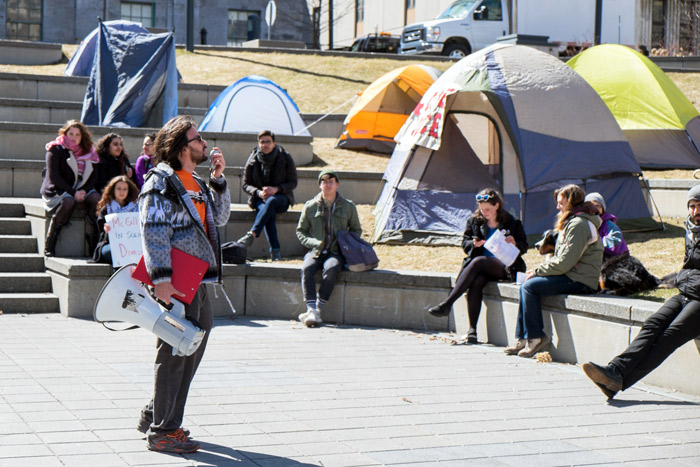On Sept. 23, members of the McGill community gathered in Chancellor Day Hall for the first Open Forum on Sustainability in a series organized mandated by the Provost. Two more forums will follow, one on the downtown campus at Thomson House on Sept. 28, and the other on MacDonald campus at the Macdonald Stewart Building on Sept. 30.
According to Frédéric Bachand, an associate professor in the Faculty of Law and chair of the Open Forum, the events are being held after Divest McGill’s petition to the Committee to Advise on Matters of Social Responsibility (CAMSR) last academic year. Divest McGill is a student group that lobbies for the university to withdraw its investments in fossil fuel companies and reallocate the funds to sustainable industries. The petition, which urged the university to divest its endowment in fossil fuel partners, was rejected by CAMSR. In response, Divest McGill staged a sit-in in Principal Suzanne Fortier’s office and on the steps of Community Square last March.
The group later met with Principal Fortier and Provost and Vice-Principal (Academic) Christopher Manfredi. In response to Divest McGill’s sit-in, Principal Fortier committed to holding open forums on the recommendations made by the CAMSR report and sustainability.
“It is in context of the discussion that Divest McGill had with the administration [after the sit-in] that the administration created the open forum to provide an opportunity for the community to consult on various aspects of McGill’s sustainability and climate change initiatives,” Professor Bachand said.
The first forum was attended by students, professors, and members of Divest McGill. Principal Fortier and Provost Manfredi were also present.
Jed Lenetsky, an organizer of Divest McGill, believes the forums are beneficial for the McGill community.
“I think [the forum] is a very powerful opportunity for not only the McGill community, but also for the McGill administration, to not only listen to the students, but to hear how students feel about these issues,” Lenetsky said.
According to Alison Gu, another activist with Divest McGill, the forums are a good starting point, but more must follow.
“What the McGill administration is doing should constantly reflect what the students, the faculty, and members of the McGill community actually want,” Gu said. “[The forums] should not be a temporary solution.”
For others, including Leo Tronchon, a U1 Arts and Science student who attended the event, the forum highlighted a need for action by the university.
“I’m a little disappointed,” said Tronchon. “I came to McGill with more hopes for sustainability. On the website, they show sustainability as a strong value of McGill. It doesn’t feel right to see the administration on the defensive.”
David Aird, vice-president (VP) External Affairs at the Students’ Society of McGill University (SSMU), agreed.
“McGill likes to claim it is very sustainable, but in real terms it is not doing nearly enough,” Aird said. “I’m waiting to see if some concrete action from the administration will happen and whether they will be accountable.”
According to Ram Panda, a board member of McGill’s Faculty Advisory Board for the Faculty of Engineering and chair of CAMSR, the McGill administration will seek a solution.
“We are all striving for the same commitment and something has to be done. [CAMSR] accepts it as well because the long-term climate change is going to be very injurious to all of us,” Panda said. “How we get there and with what forms and with what methods is up for a long debate.”
Written contributions from people who want to join the conversation, but cannot make the forums, can be sent to [email protected] or posted on the discussion board at blogs.mcgill.ca/open-forum-sustainability








